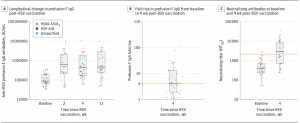Respiratory syncytial virus (RSV) is a common respiratory virus that can cause severe infections, especially in infants, the elderly, and those with compromised immune systems. While the virus is typically associated with mild cold-like symptoms, it can lead to serious conditions such as pneumonia in vulnerable populations. Vaccines targeting RSV, including RSVPreF3-AS01 (Arexvy) and RSVpreF (Abrysvo), were recently developed to elicit strong immune responses by targeting the virus’s pre-fusion F protein, a key component for infection.
A recent study highlights that older adults with weakened immune systems, particularly organ transplant recipients on immunosuppressive medications, exhibit a weaker and more variable response to RSV vaccines compared to their peers with normal immune function (Figure 1). These findings provide critical insights into vaccine effectiveness in immunocompromised populations and underline the need for tailored vaccination strategies.

Figure 1: Antibody Responses Among Immunocompromised Adults Following Respiratory Syncytial Virus (RSV) Vaccination. Dots represent individual antibody titer values at baseline and at postvaccination time points. Horizontal lines within each box plot indicate the median value. Boxes indicate the IQR, with upper edge representing the third quartile (Q3), lower edge representing the first quartile (Q1), and whiskers extending to 1.5 times the IQR beyond Q3 and Q1, respectively. B, Dashed line represents a 4-fold rise in prefusion F IgG (ie, seroconversion). C, Dashed line represents high-titer neutralization, corresponding to high-titer polyclonal prevaccine-era reference sera (BEI Resources, NR-4021; NT50, 2175).
Key findings include:
- Weaker Antibody Responses: On average, immunocompromised participants developed fewer neutralizing antibodies against RSV compared to healthy individuals over 60, as seen in clinical trials for these vaccines.
- High Variability: Immune responses among immunocompromised participants were inconsistent, with some showing robust increases in antibody levels and others exhibiting minimal response.
- Adjuvanted Vaccines Show Promise: Participants who received Arexvy, an adjuvanted vaccine, tended to produce higher levels of neutralizing antibodies compared to those who received Abrysvo. Adjuvants are substances added to vaccines to enhance immune responses, suggesting a potential avenue for improving vaccine efficacy in immunocompromised individuals.
The findings do not imply that RSV vaccines are ineffective in people with weakened immune systems. Even modest increases in immunity could help reduce the severity of RSV infections in this high-risk group. However, the study underscores the need for further research into why immune responses vary and how to optimize vaccine performance for these individuals.
Future research must focus on improving vaccine formulations, understanding the mechanisms behind variable immune responses, and exploring additional strategies, such as booster doses or alternative adjuvants, to enhance protection for immunocompromised individuals. These efforts aim to close the immunity gap and better protect vulnerable populations from RSV and other infectious diseases.
Journal article: Karaba, A.H., et al., 2024. Antibody Response to Respiratory Syncytial Virus Vaccination in Immunocompromised Persons. JAMA.
Summary by Stefan Botha










